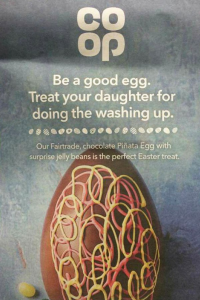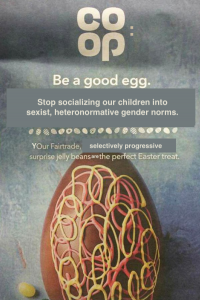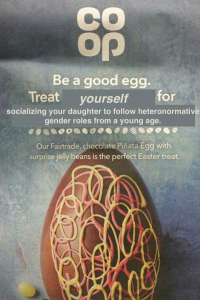
The “Good Egg marketing campaign” (Voinea, 2017) represented by this advertisement is problematic in its assignment of gender roles. The ad focuses on the reward a child would have for following parental orders and being responsible for a part of the household duties. The Co-operative Group (Co-op) is insinuating that their chocolate eggs, pictured at the bottom of the ad, would make a wonderful treat for a well-behaved (“good”) child and are attractive to the ethical consumer as it made from Fair Trade ingredients. However, the chosen combination of a daughter “doing the washing up” is blatantly sexist and aimed at the traditional gender roles of the heteronormative nuclear family.
Socialization is important in an individual’s ability to integrate into society. Children are largely influenced by family and the media when formulating connections between gender, identity and society. What a parent decides to teach their child about their role in the family will ultimately be extrapolated when they grow and enter society as functional members. “Social policing” is also a way in which children are rewarded or punished for following or ignoring masculine and feminine pre-set gender roles (Wilchins, 2019) by their most immediate connections. By the time a child has entered adolescence, they have already been exposed to so many forms of media depicting how males and females should act and therefore what is expected of them (Wilchins, 2019).
To Jivka Marinova (2003), socialization of gender provides a “basis for identifying differences and inequalities between women and men in responsibilities assigned, [and] activities undertaken, … as well as decision making opportunities.” This ad instills the inequalities between men and women in parenting practices and ultimately will lead to children growing up with these institutionalized gender divisions, formed from the messages of ads like this one.
Social norms refer to what is widely accepted and shared, but these are always changing with time (Wilchins, 2019). Traditionally, gender roles include the idea of the heteronormative, nuclear family—in which a man and woman married and had 1.5 children, the man was the breadwinner and the woman was left to stay at home and maintain an orderly house. However, the definition of the family unit is evolving to include other definitions, such as same-sex, single and multi-household families. Therefore, gender roles from earlier in time cannot be represented in an ad published in 2017.
Wilchins (2019) also mentions that “gender stereotypes are always raced, just as racial stereotypes are always gendered.” From this, it is important to acknowledge that an ad that appears to be a simple distinction between men and women cannot be removed from intersectionality.


The aforementioned deconstruction of gender norms provided me plenty of room to change Co-op’s ad to emphasize the influence of both advertisements (the media) as well as the family unit in the outdated gendered socialization of children.
I have made two versions of the original ad. The first exposes Co-op as a company, which therefore inadvertently calls out the media, in the wrongful socialization of children. The ad now changes the focus onto the company to follow their own advice and “be a good egg” by stopping their sexist attitude towards gender roles in this day and age.
In addition, this ad could be looked at in terms of social class, as Fairtrade products can be relatively more expensive than regular prices. So, this ad may only be targeting middle- and upper-class families. But stepping away from social class, it is preposterous that a company that is supporting ethical trading and consumerism is still deciding to portray such a sexist message to its consumers, which is why I changed the bottom sentence on the company jammed-ad to question their selectively progressive ethics and mindset.
The second version draws attention to the parents or the family as being the other strong force of socialization in children. By adhering to the message portrayed in the advertisement, parents are also a large factor in keeping classical gender stereotypes alive in society. Buying products from Co-op might be ethical in terms of the materials sourced but are not progressive in supporting a company who are selectively progressive in their conduct. This ad asks the parent to also “be a good egg” and change their mindsets.
The good news is, however, that this ad was originally printed in the UK in 2017. Since then, there has been a ban on harmful gender stereotype advertisements in the UK, following a review by the Advertising Standards Authority, which administers the codes of advertising for the area (The Advertising Standards Authority, 2019). This will continue to move liberal social norms about gender, femininity and masculinity forward and ensure the next generations are progressively socialized.
References
The Advertising Standards Authority (2019, June 14). Ban on harmful gender stereotypes in ads comes into force. CAP News, Retrieved from: https://www.asa.org.uk/news/ban-on-harmful-gender-stereotypes-in-ads-comes-into-force.html
Marinova, J, (2003). Gender Stereotypes and the Socialization Process. Division for the Advancement of Women (DAW) in collaboration with International Labour Organization. Retrieved from https://www.un.org/womenwatch/daw/egm/men-boys2003/EP3-Marinova.pdf.
Wilchins, R. (2019). Gender norms and intersectionality: Connecting race, class and gender.Retrieved from https://ebookcentral.proquest.com.
Voinea, A. (2017, April 7). Co-op apologises for gender stereotyping in press ad. Retrieved from https://www.thenews.coop/115548/sector/retail/co-op-apologises-gender-stereotyping-press-ad/